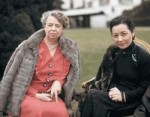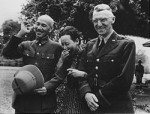Song Meiling: the Lady Who Loves Power
Song Mei ling was one of the three Song sisters and described as “the one who loved power”. As the wife of Chiang Kai-shek, she was also known as Madame Chiang Kai-shek and played a prominent role in the politics of the Republic of China.
loved power”. As the wife of Chiang Kai-shek, she was also known as Madame Chiang Kai-shek and played a prominent role in the politics of the Republic of China.
The fourth of six children, she was born in Shanghai to Charlie Song, a Methodist minister and businessman who made a fortune selling bibles in China. Meiling attended Motyeire School, an American private school, in Shanghai at the age of eight. She started college at her sisters’ alma mater, Wesleyan College in Macon, Georgia, but transferred to Wellesley College and graduated with honors in 1917 with a major in English literature and minor in philosophy. As a result of being educated in the United States she spoke excellent English with a pronounced Georgian accent which helped her to connect with American audiences.
Song Meiling met Chiang Kai-shek in 1920. Since he was eleven years her elder, already married, and a Buddhist, Meiling’s mother vehemently opposed the marriage between the two, but finally agreed after Chiang showed proof of his divorce and promised to convert to Christianity. Chiang told his future mother-in-law that he couldn’t convert immediately, because religion needed to be gradually absorbed, not swallowed like a pill. While some biographers regard the marriage as one of the greatest love matches of all time, others describe it as a marriage of convenience. The couple never had any children.
Madame Chiang initiated the New Life Movement and became actively engaged in Chinese politics. She was a member of the Legislative Yuan from 1930 to 1932 and Secretary-General of the Chinese Aeronautical Affairs Commission from 1936 to 1938. In 1945 she became a member of the Central Executive Committee of the Kuomintang. As her husband rose to become Generalissimo and leader of the Kuomintang, Madame Chiang acted as his English translator, secretary and advisor. During World War II, Madame Chiang tried to promote the Chinese cause and build a legacy for her husband on par with Roosevelt, Churchill and Stalin. Well versed in both Chinese and western culture, she became popular both in China and abroad. Her prominence led Joseph Stilwell to quip that she be appointed minister of defense.
In the United States, she drew crowds up to 30,000 people and made the front cover of TIME magazine, first with her husband as “Man and Wife of the Year” and second under the title “Dragon Lady.” On February 18, 1943, she became the first Chinese national and second woman to address the U.S. Congress.
After the defeat of her husband’s government in the Chinese Civil War in 1949, Madame Chiang followed her husband to Taiwan, while her sister Song Ching-ling stayed on the mainland, siding with the communists. Madame Chiang continued to play a prominent international role. She was a Patron of the International Red Cross Committee, honorary chair of the British United Aid to China Fund, and First Honorary Member of the Bill of Rights Commemorative Society. Through the late 1960s she was included among America’s 10 most admired women.
After the death of her husband in 1975, Madame Chiang assumed a low profile. Chiang Kai-shek was succeeded to power by his eldest son Chiang Ching-kuo, from a previous marriage, with whom Madame Chiang had rocky relations. In 1975, she emigrated from Taiwan to her family’s 36 acre (146,000 m²) estate in Lattingtown, Long Island, where she kept a portrait of her late husband in full military regalia in her living room.
 Madame Chiang returned to Taiwan upon Chiang Ching-kuo’s death in 1988, to shore up support among her old allies. However, Chiang’s successor as president, Lee Teng-hui, proved to be more adept at politics than she was, and consolidated his position. As a result, she again returned to the U.S.
Madame Chiang returned to Taiwan upon Chiang Ching-kuo’s death in 1988, to shore up support among her old allies. However, Chiang’s successor as president, Lee Teng-hui, proved to be more adept at politics than she was, and consolidated his position. As a result, she again returned to the U.S.
Madame Chiang made a rare public appearance in 1995 when she attended a reception held on Capitol Hill in her honor in connection with celebrations of the 50th anniversary of the end of World War II. Madame Chiang also made her last visit to Taiwan in 1995.
In the 2000 Presidential Election on Taiwan, the Kuomintang produced a letter from her in which she purportedly supported the KMT candidate Lien Chan over independent candidate James Song (no relation). The authenticity of the letter was the subject of great debate in Taiwan. (However, it should be noted that James Song himself had never disputed the authenticity of the letter, which might have been written as a payback for James Song’s veiled criticism of her earlier, in support of Lee.)
Song sold her Long Island estate in 2000 and spent the rest of her life in her Gracie Square apartment surrounded only by black-suited bodyguards who cleared the lobby as she passed.
Song died in New York City, in her Manhattan apartment in 2003 at the age of 105 or 106. Her remains were temporarily interred at Ferncliff Cemetery in Hartsdale, New York, pending an eventual burial with her late husband who was entombed in Tzuhu, Taiwan. The stated intention is to have them both buried in mainland China once political conditions make it possible.